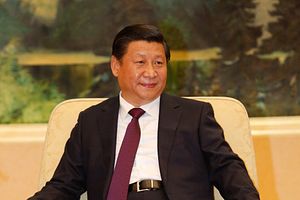All eyes at home and abroad were on Chinese President Xi Jinping as he kicked off the Chinese Communist Party’s (CCP) 19th Party Congress — the most important Chinese political event, held once in every five years — during which the top Chinese leadership will be reshuffled.
On the morning of October 18, Xi took nearly three and a half hours to present the opening speech — known as a work report — under the title of “To secure a decisive victory in building a moderately prosperous society in all respects and strive for the great success of socialism with Chinese characteristics for a new era.” The work report is a chance for the Party’s top leader to showcase achievements since the previous Party Congress and outline future endeavors. While the comprehensive speech covers almost every field related to China’s development and the Chinese people’s well-being, the followings are the three major points particularly worth noting for observers interested in the CCP’s security policy.
1. China will create a world-class military
Xi, who also holds the position of chairman of the Central Military Commission (CMC), said China will keep strengthening the military and comprehensively promote national defense and military modernization, including “a modern army, navy, air force, rocket army, and strategic support force, and a strong and efficient command agency for joint operations.”
Xi also set the goals for Chinese military: by 2020, Chinese military should have basically realized mechanization, made significant progress in information technology, and made a big leap in strategic ability; by 2035, modernized national defense and military should be basically achieved; and by 2050, the Chinese military should be a world-class one.
“A military is prepared for war. All military works must adhere to the standards of being able to fight a war and win a war.” said Xi, “Our army is the people’s army; our defense is national defense. [We must] enhance the education on national defense education, consolidate the unity between the military and civilian, in order to achieve the Chinese dream of a strong military.”
In fact, since Xi came into office five years ago, he had repeatedly emphasized “the Chinese dream of a strong military” and the goal of fostering a military that can win wars.
With these goals in place for China’s military modernization, expect China’s national defense expenses will keep soaring in the following years.
2. Flexing muscles toward Taiwan
Although many analysts already anticipated that Xi would mention Taiwan during his speech — as Taiwan remains one of the most sensitive and critical issues for the CCP — Xi’s strong remarks this time still somewhat exceeded people’s expectations.
Regarding Taiwan, Xi said in his speech:
[We will] resolutely safeguard the national sovereignty and territorial integrity and will absolutely not tolerate the tragedy of the country’s split. Any activity aiming to split the motherland will be firmly opposed by all the Chinese people. We have a firm will, sufficient faith, and adequate capacity to defeat any intention of “Taiwan independence” in any form. [We will] never allow any person, any organization, any political party, at any time, in any form, to separate any piece of Chinese territory from China.
In addition, Xi stressed the importance of the “1992 Consensus”, or the “One China principle,” which Taiwan’s President Tsai Ing-wen has been refusing to publicly recognize since she came into office last year.
Xi said the 1992 Consensus is the key to ensuring the peaceful development of cross-strait relations. “Only by recognizing the historical facts of the ‘1992 Consensus’, that both sides belong to one China, can the two sides across the Strait start to have a dialogue.”
Since Tsai came into office, the cross-strait relationship has been deteriorating. China’s Taiwan Affairs Office has stopped a regular dialogue mechanism with its Taiwanese counterpart, the Mainland Affairs Council. That was the only direct official pipeline between the two central governments across the Strait. Xi’s rhetoric has once again made it clear that recognizing the “1992 Consensus” is the precondition for the CCP to resume the dialogue mechanism. It’s also likely that Xi will add more pressure on Tsai after the Party Congress.
3. Dangling a carrot to Hong Kong
This year marks the 20th anniversary of Hong Kong’s return to China. Meanwhile, the tensions between Hong Kong and the mainland have shown signals of escalating. Some Hong Kong people have even called for independence from China, as The Diplomat has reported. An increasing number of analysts are starting to cast a doubtful light on the “one country, two systems” principle implemented in Hong Kong.
In his speech, Xi also specially discussed Hong Kong and the “one country, two systems” principle.
Compared to his remarks on Taiwan, Xi’s tone toward Hong Kong was significantly softer. He said the central government will support Hong Kong as well Macau to fully get involved in the overall development of the whole country, promote the mainland’s cooperation with Hong Kong and Macau, and put forward policy to facilitate Hong Kong and Macau citizens developing the mainland.
Despite the carrot, Xi didn’t forget to emphasize the central government’s authority in Hong Kong. “[We must] maintain the central authority in Hong Kong and guarantee Hong Kong’s autonomy at the same time. [We must] ensure that the ‘one country, two systems’ policy will not change or deform,” said Xi.
































